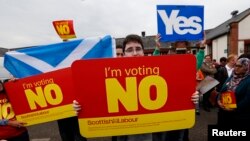The British government scrambled Sunday to respond to a lurch in the opinion polls toward a vote for Scottish independence this month by pledging greater autonomy for Scotland if it chooses to stay within the United Kingdom.
British finance minister George Osborne said on Sunday greater tax, welfare and spending powers would be announced in the coming days and would be implemented if Scotland votes in a historic referendum on September 18 to remain in the 300-year-old union with England.
The government's offer came after a YouGov poll published in The Sunday Times newspaper gave the "Yes" camp 51 percent support compared to the "No" camp's 49 percent, excluding undecided voters. Six percent said they had not made up their minds.
A month ago, the 'no' vote held a 22-point lead.
Although the two-point lead is within the margin of error, the findings dramatically up the stakes ahead of the vote, giving momentum to Scottish First Minister Alex Salmond and his separatist Scottish National Party (SNP).
'Engulfed in panic'
Scottish Deputy First Minister Nicola Sturgeon said the British government's "Better Together" campaign seemed to be "engulfed in panic" as the competition for votes tightens.
Sturgeon said that if the British government was serious about giving Scotland more financial powers it would not have waited until two weeks before the referendum.
"There is no option of more powers short of independence on the ballot paper," she said. "There is no guarantee whatsoever that if Scotland votes 'no' we will get a single additional power for the Scottish Parliament."
Osborne said the changes, being agreed by all three major parties in the British parliament, would be put into effect the moment there was a 'no' vote in the referendum.
“You will see in the next few days a plan of action to give more powers to Scotland. ... Then Scotland will have the best of both worlds. They will both avoid the risks of separation but have more control over their own destiny, which is where I think many Scots want to be,” Osborne said.
“More tax-raising powers, much greater fiscal autonomy ... more control over public expenditure, more control over welfare rates and a host of other changes," he added.
Osborne's comments echo those of former British Prime Minister and opposition Labor party lawmaker Gordon Brown, who said on Friday he would spearhead a push for Scotland to gain more powers if it voted against independence.
British Prime Minister David Cameron had, ironically, vetoed a third ballot option for greater devolution, betting that the stark choice of yes or no to independence would deliver a clear victory for the status quo as cautious voters turned away from an uncertain future.
Breakaway surge
After months of surveys showing nationalists heading for defeat, recent polls have seen the gap narrow to the extent that they raise the real prospect that secessionists could achieve their goal of breaking with England.
“A two-point gap is too small for us to call the outcome. But the fact that the contest is too close to call is itself remarkable, as Better Together seemed to have victory in the bag,” YouGov President Peter Kellner wrote on his blog.
“In the past four weeks support for the union has drained away at an astonishing rate. The Yes campaign has not just invaded No territory; it has launched a blitzkrieg.”
A separate poll on Sunday by Panelbase, commissioned by the pro-independence campaign, showed the 'no' camp ahead by four points, 52-48. The poll showed support for a breakaway rising but still short of a majority at 48 percent. When undecideds were included, that fell to 44 percent.
Some material for this report comes from Reuters, AFP and AP.





